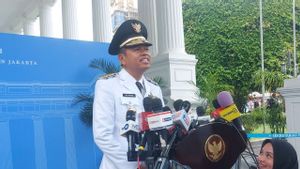MAKASSAR - In order to screen the levels of carbon monoxide (CO) content in adolescents, the Makassar City Health Service has dispatched a Smoking Cessation Effort (UBM) service team from public health centers in all public junior high schools in Makassar City.
This activity is in collaboration with the Education Office, with the aim of detecting and analyzing the presence of carbon monoxide in the breath of each student
Head of the Disease Prevention and Control Division of the City Health Office Andi Mariani said, apart from being one of the efforts to screen for non-communicable diseases, this examination is intended to see exposure to carbon monoxide.
According to him, this condition can be caused by exposure to cigarette smoke. Therefore, this activity can also educate and later is expected to reduce the prevalence of smokers in their teens.
"From Riskedas data in 2018, there was an increase of 9.1 percent of teenage smokers or around 3.2 million children from the government target to decrease to 5.4 percent in 2019 (Kemenkes RI, 2019)," Mariani said in a written statement, Monday. , July 18th.
In Makassar City, referring to a survey in 2017, it is known that the number of smokers under the age of 18 reached 11.9 percent. While the average child starts smoking at the age of 13 years with an average consumption of 8 cigarettes per day.

From the survey, it is shown that around 31 percent of the teenagers surveyed think that exposure to cigarette promotion media is a reason for smoking.
From that figure, Nani as Mariani calls her, believes that smoking is a double burden of disease in Indonesia.
"The pattern of non-communicable diseases is strongly influenced by the behavior of the community, socio-economic and socio-cultural. The prevalence of non-communicable diseases (NCDs) continues to increase and undergoes a transition to disease epidemiology in the productive age," he said.
"To improve public health, one of the efforts made by the state is to oblige all local governments to develop Non-Smoking Areas (KTR)," he continued.
This refers to the Regulation of the Minister of Education and Culture Number 64 of 2015 concerning Non-Smoking Areas in schools which aims to create a clean, healthy and smoke-free school environment.
Whereas in Makassar City, it has been regulated in Regional Regulation No. 4 of 2013 concerning Non-Smoking Areas in several settings, one of which is in teaching and learning places.
The English, Chinese, Japanese, Arabic, and French versions are automatically generated by the AI. So there may still be inaccuracies in translating, please always see Indonesian as our main language. (system supported by DigitalSiber.id)













